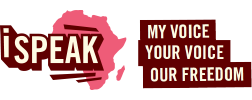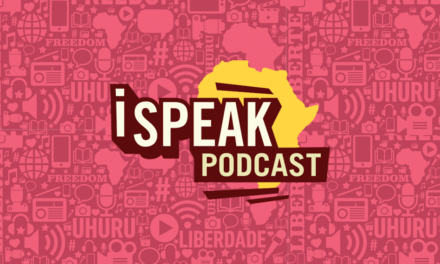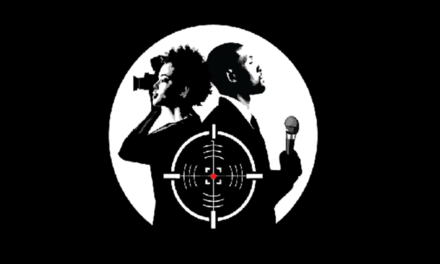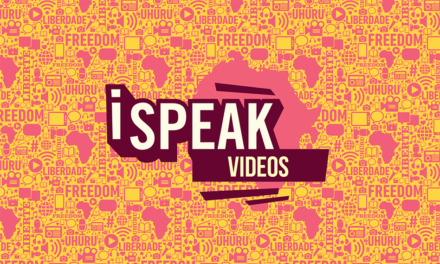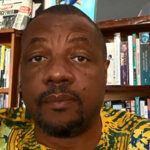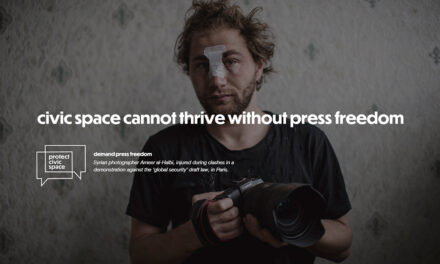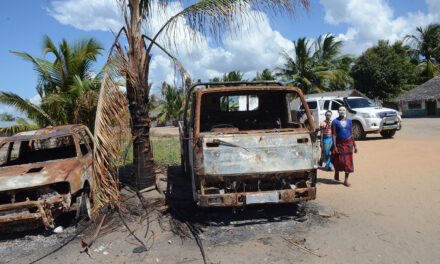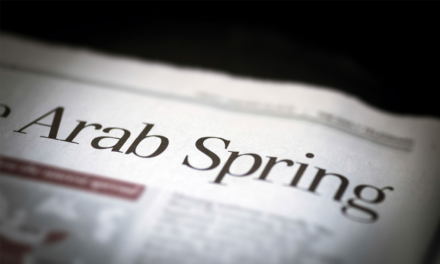
Journalists caught in the crosshairs of impunity
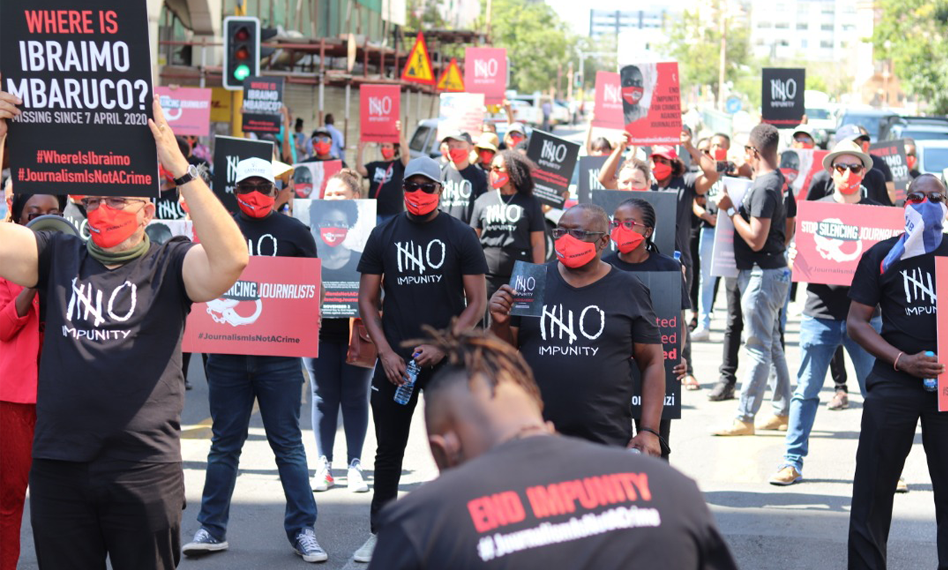
Over the last three years there’s been a sharp increase in threats, assaults and attacks on media practitioners and media outlets in Africa. Just this year alone, 13 journalists have been killed in nine months.
On the one hand, transgressions are being committed by people who recognise the critical role of the media in holding power to account, and in sharp contrast there is the blatant dismissal of the media’s integral role as the fourth pillar of accountability by governments. This is evidenced by their aversion to carrying out meticulous investigations into the crimes being committed against journalists. Undoubtedly an alert and courageous media is a clear threat to the agenda of all these adversaries.
Reyhana Masters unpacks the thriving culture of impunity while in conversation with Zoé Titus, director of the Namibia Media Trust.
As the world marks International Day to End Impunity #2021, Africa is grappling with shocking statistics. Although it may be difficult to prove that all 13 murders are directly linked to their profession, it is nonetheless disturbing.
Zoé Titus: I think that this is a shocking number. It’s unprecedented and it really requires engagement by the public, and by policy makers. Since this onslaught on journalists and journalism is problematic for our democracies, it should be very, very worrying to all citizens.
Giving impetus to the boldness of these attacks, is the lack of political will in providing credible and coherent responses to these violations. The thriving culture of impunity is not only an indicator of how the media is being purposefully debilitated, but it also points to weak policing and justice systems.
April 7 marked two years since the disappearance of Ibrahimo Abu Mbaruco in the Cabo Delgado region of Mozambique. A collective effort by international and African civil society organisations asking Mozambican President Filipe Nyusi to carry out a thorough investigation into his enforced disappearance was disregarded. As was their deep concern about the violence inflicted by government forces against journalists reporting in the region.
The death of Cameroonian journalist Samuel Wazizi – 10 months after he was taken into military custody – was announced in the most shocking manner, leaving the media fraternity and media advocacy organisations reeling in disbelief.
Wazizi was arrested on August 2, 2019 and detained at a police station in the western city of Buea, after being accused of being a terrorist. That was the last time his lawyer and family had any contact with him. “For ten months, the Cameroonian authorities concealed his death and refused to provide any information about his fate to his family and lawyers, and to NGOs that had raised the issued.” Two years later, the family still don’t know when or how Wazizi died.
At one point in time it was possible to link the targeting of journalists to very specific State and non-State actors, but over the years the list of wrongdoers has expanded and the reasons behind their actions are manifold.
At the core of Africa’s thriving culture of impunity is the lack of political will to investigate the killings of journalists in any meaningful or impactful manner, leading to the lack of accountability that further fuels the tendency to continue attacking the media.
Zoé Titus: The lives of journalists seem to hold very little value because those that take those lives do so with impunity because there are no repercussions for what they do. Perpetrators wield both political and economic power. It’s an indictment on our society because we allow it.
This is driving media advocacy organisations into taking desperate action.
The pronouncement by Minister of Information and Culture, Lai Mohammed at the 39th Session of the General Conference of the United Nations Educational, Scientific and Cultural Organisation in 2020, that: “the Nigeria media is acknowledged as one of the freest in the world’’, is disputed by Edetaen Ojo – the executive director of Media Rights Agenda who highlighted in his tweet just a day before #IDEI2021 that: “In Nigeria, killers of journalists enjoy impunity in all cases – 100%! No one has ever been arrested or charged with killing a journalist, much less convicted or punished!”
Subsequently, MRA has filed a suit at the ECOWAS Community Court of Justice in Abuja over the failure of the Federal Government of Nigeria to effectively investigate, prosecute and punish perpetrators of the murders of 11 journalists killed between 1998 and 2019, and is asking the court to direct the Government to pay the families of each of the journalists N10 million as reparation.
Zoé Titus: Right now, there is a coup in Sudan, protests in eSwatini and a few months back, there was an insurgency in Mozambique. A lot of this has to do with both political and economic forces, and power plays between different factions, who are seeking political power, economic power, and who are willing to let citizens suffer for very selfish interests. It’s driven by greed and it’s based purely on a lack of accountability. At the core of it is a lack of appreciation for the need to develop and sustain an equitable society.
As much as it is necessary to highlight attacks, it is equally imperative to understand the circumstances which make journalists vulnerable.
Journalists are particularly exposed :
- In rich resource states that fall into the category of failed states with flailing economies. This is especially so, where the State has tight control over those resources and cronies are benefitting from the sales of these resources.
- In countries where the economy is decline and there are subsequently high levels of corruption.
- In countries where there is the lack of political will to carry out independent and thorough investigations into the death of journalists;
- In countries where crimes against the media are politicised
- In regions where governments have failed to contain armed groups as is the case in the Sahel region;
- When reporting people-driven protests demanding democratic reforms in authoritarian States and
- To the growing intolerance in the political sector with ruling parties brutally opposing views and opposition parties attacking the media for reporting their inadequacies.
A prime example of a highly volatile country to operate in, is the Democratic Republic of Congo. Ravaged by war almost two decades ago, the country is still fraught with political instability, armed clashes and human rights violations. This unwittingly places journalists at the centre of the target.
While it is considered one of the wealthiest countries in Africa in terms of resources, it is also rated in the top 10 of the most highly corrupt countries and has the poorest citizens in Central Africa. Civilians are caught in the crossfire of attacks between military and armed insurgent groups in the eastern part of DRC. Responding to the escalating violence, President Felix Tshisekedi placed the Ituri and Nord Kivu provinces under a military siege but this has done little to deter the attacks on the media. With radio being the most popular medium for dissemination of information, broadcasters operating in the area are caught in the crosshairs for reporting on the conflict.
In May 2021, broadcaster Barthelemy Kubanabandu Changamuka was fatally shot at point blank range in Kitshanga. On August 8, Héritier Magayane who worked for state broadcaster Congolese National Radio and Television (RTNC) was found with his throat slit in North Kivu province and just two weeks later Joël Mumbere Musavuli was stabbed and killed in his home in Ituri province.
On September 26, Prince Syaghendera, “a reporter for Tuendelee community radio and the Bunia-Info24 news website was forced to go into hiding after his home in Komanda, in Ituri province, was reduced to ashes in the space of a few hours,” as reported by Committee to Protect Journalists.
This observation is supported by the latest Global Impunity Index recently unveiled by the Committee to Protect Journalists which places Somalia as the world’s worst country for unsolved killings of journalists.
Attacks and deterrence on journalists
There have been numerous incidents of journalists being prevented from reporting on political events and being indiscriminately attacked by party loyalists as seen in Zambia’s polarised political landscape during the campaign period. Attacks even spill into the pre and post electoral processes as witnessed during Uganda’s tense and brutal 2020/21 electoral campaign. Even media-friendly Ghana had reports of journalists being attacked during its December 2020 election. Currently news crews in South Africa covering the campaign period of the pending municipal elections are being targeted by criminals and party members.
Journalists covering protests and demonstrations are being assaulted alongside civilians in countries like Nigeria, Guinea, Togo and most recently in South Sudan and eSwatini. Unfortunately the very qualities that make for an exceptional journalist are the same talents that make a journalist a moving target – most specifically to corrupt politicians and government officials colluding with corporates to covering up malfeasance.
Why should the attacks on the media matter to us all?
Zoé Titus: I work from the perspective that if a journalist’s life is at risk, or if a journalist is shot or mowed down, or attacked for doing his or her work, it is fundamentally all citizens who suffer as a result. There are so many really good examples of how the media has changed people’s lives. I work with an organization and a media house that can speak to that. I mean, we cannot imagine for example, Namibia’s independence, without considering the role that The Namibian newspaper has played in that.
The most critical issue moving forward, is how to get people and even more importantly, policymakers to pay attention to the crimes being committed against journalists on this continent. For in as much as the media advocates on behalf of citizens and their rights, the public has to speak out for journalists too.
Zoé Titus: If we go back and consider for a moment how African civil society organizations and policy advocates have contributed and impacted global policy on media freedom and freedom of expression, there is no doubt that we have the capacity to lead a campaign that delivers justice to the journalists and most importantly, the families of journalists who have been persecuted.
But it requires a concerted, focused and collective effort designed by and led by African civil society organizations which is supported by diverse global actors.
We’ve done it before and we can do it again.
